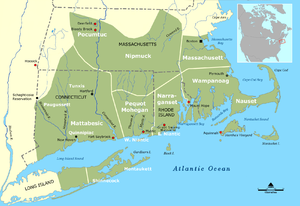Narragansett language
| Narragansett | |
|---|---|
| Native to | United States |
| Region | Rhode Island |
| Extinct |
~17th century (?)
|
|
Algic
|
|
| Language codes | |
| ISO 639-3 | |
|
Linguist list
|
xnt |
| Glottolog | narr1280 |

The location of the Narragansett tribe and their neighbors, c. 1600
|
|
~17th century (?)
Narragansett /ˌnærəˈɡænsɪt/ is an extinct Algonquian language formerly spoken in most of what is today Rhode Island by the Narragansett people. It was closely related to the other Algonquian languages of southern New England like Massachusett and Mohegan-Pequot. The earliest study of the language in English was by Roger Williams, founder of the Rhode Island colony, in his book A Key Into the Language of America (1643).
The word Narragansett means, literally, "(People) of the Small Point." The "point" may be located on the Salt Pond in Washington County. (Great Salt Pond Archeological District).
Traditionally the tribe spoke the Narragansett language, a member of the Algonquian language family. The language became almost entirely extinct during the Narragansetts' centuries of living within the larger English-majority society, through forced assimilation.
The tribe has begun language revival efforts, based on early-20th-century books and manuscripts, and new teaching programs. The Narragansett spoke a "Y-dialect", similar enough to the "N-dialects" of the Massachusett and Wampanoag to be mutually intelligible. Other Y-dialects include the Shinnecock and Pequot languages spoken historically by tribes on Long Island and in Connecticut, respectively.
...
Wikipedia
